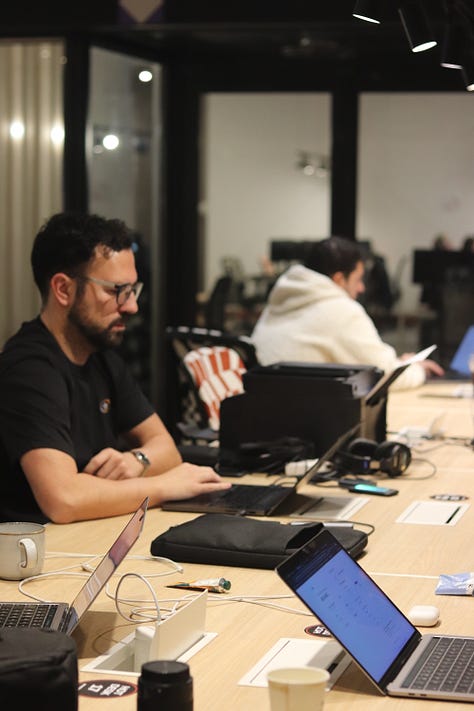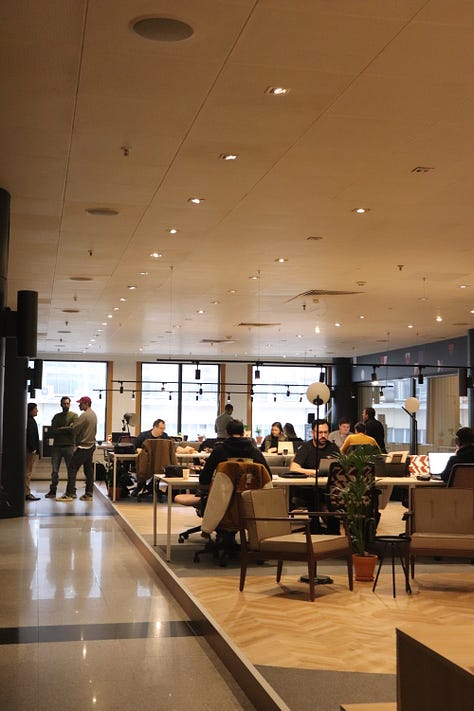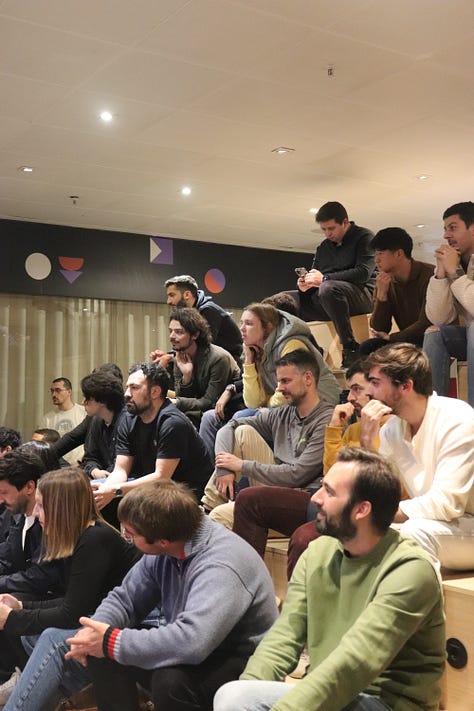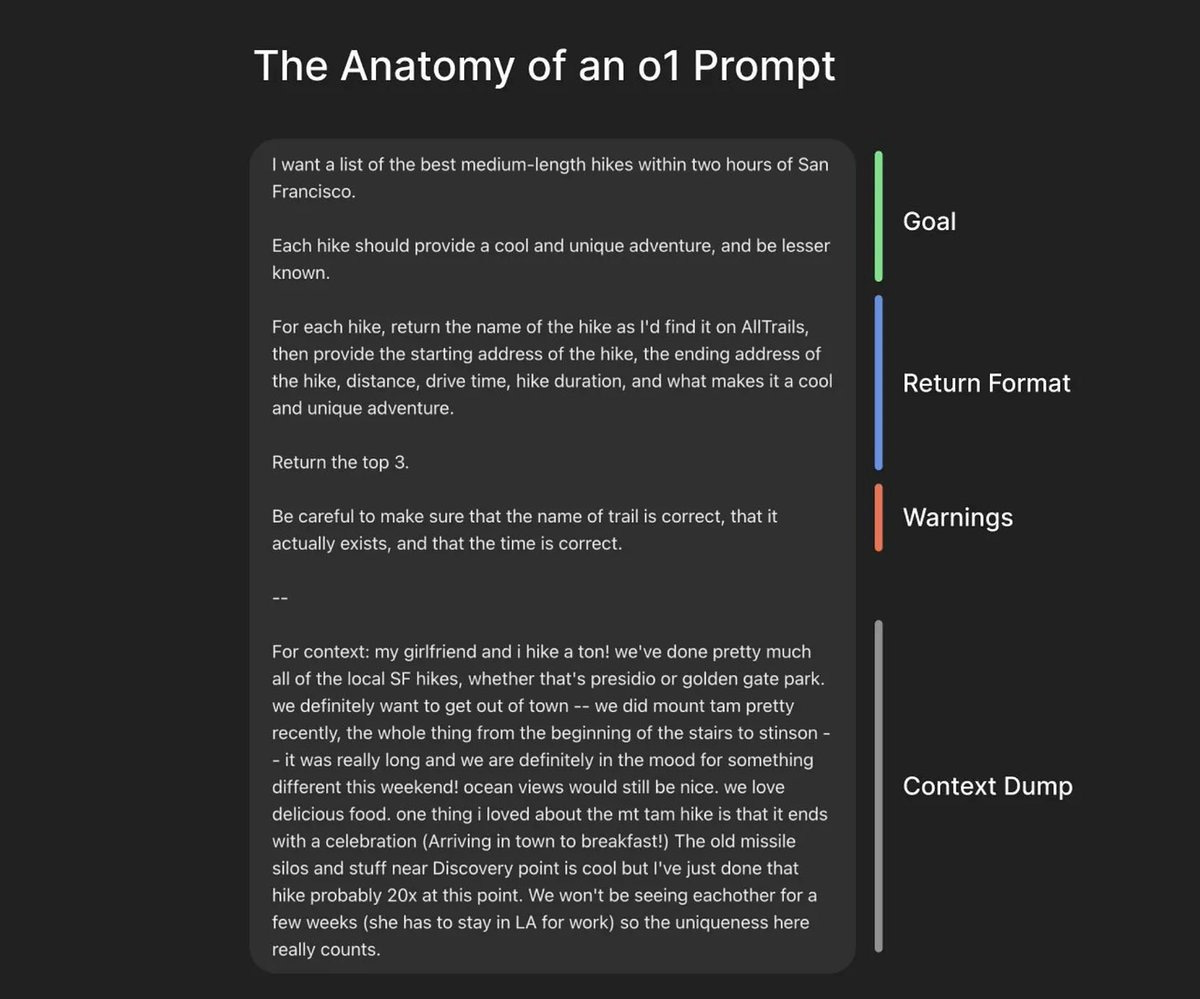Beyond the Mainframe Nº2 | Laika Ventures
New Innovations on AI while geopolitical competition escalates 🇫🇷 France joins the race!
Welcome to Laika Ventures’ monthly newsletter! We promise to bring you the most relevant news on AI, fire 🔥 discussions, and more.
We all know trying to stay updated on what’s happening in AI can be difficult with so much going on, and this month’s newsletter is packed with news, as we watched countries (and companies) trying to position themselves in the AI race.
France 🇫🇷 is trying not to stay behind and announced its investment of billions during the AI Action Summit in Paris to counterbalance USA 🇺🇸and Chinese 🇨🇳 dominance. And while this happened, so many interesting new models and applicabilities of AI emerged this month, from startups (Groq invested by Saudi Arabia, Clone Robotics creeping people out, and more) to corporate companies (Google, Adobe, Amazon, GitHub, etc) to celebrities (Kanye West is using AI in his next album, AI Super Bowl, among others).
Let’s go!
SoftBank and OpenAI partnership (2nd round) 🇯🇵
Earlier this month, after announcing the investment in Stargate, SoftBank Group and OpenAI announced a partnership to develop and market Advanced Enterprise AI called “Cristal Intelligence”. This will be an annual investment of $3 billion to deploy OpenAI’s solutions across its group companies - making it the first company in the world to integrate Advanced Enterprise AI at scale.
They also agreed to establish a joint-venture company called “SB OpenAI Japan” to deploy customized Cristal Intelligence exclusively to major companies in Japan.
Another Elon Musk and Sam Altman episode 📺
Elon Musk and a group of investors led by him submitted an unsolicited bid of $97.4 billion to buy OpenAI. This comes at a time when it’s known that Sam Altman plans to restructure the company to a for-profit and abandon its non-profit roots, to prevent another “hostile takeover” as the world saw last year. The CEO of OpenAI shared in numerous interviews that “the company is not for sale” and later shared a tweet mocking Musk’s offer.
AI Action Summit in Paris 🇫🇷 🥐
On the 10th and 11th of February, Paris was the center stage of AI where heads of State and Government, international organizations and companies, researchers, and others from around the globe joined the conversation of AI development with the Sustainable Development Goals (SDGs) and establishing safeguards for human rights.
The event happened shortly after the first implementation phase of the EU AI Act, which began on 2 February 2025. This initial enforcement targeted prohibited AI practices deemed to pose "unacceptable risks" under Article 5 of the regulation.
The Public Interest AI Platform, named Current AI, was launched during the AI Action Summit, which aimed at supporting the creation of AI "public goods". Backed by $400 million from the French Government, the goal is to serve as an incubator for artificial Intelligence serving the public interest, independent solutions, open access or controlled access depending on resources, and ensuring that users have sovereign use of the technology.
The big announcement that shacked the room was made by Emmanuel Macron regarding the €109 billion investment for French AI in the private sector over the next few years. He even said, “if you compare with some big recent announcements made in the US, it’s at the right scale. This is exactly the same if we compare France to the US as a market”.
On that same event, JD Vance delivered a keynote speech warning global leaders and tech CEOs that “excessive regulation in the AI sector could kill a transformative industry just as it’s taking off”, reinforcing the USA leadership in the field and its belief that AI should be free (no censorship), and will make people more productive (not replace them).
“When conferences like this convene to discuss a cutting edge technology, often times I think our response is to be too self-conscious, too risk-averse. (…) To restrict its development now, would not only benefit incumbents in the space, it would mean paralyzing one of the most promising technologies we have seen in generations.”
-JD Vance, current Vice-President of the United States of America
Maybe there’s still hope for Europe after all 🇪🇺
In the beginning of this month, the European Union decided to provide a budget of €37.4 million to the multilingual AI project OpenEuroLLM, a new open-source large language model that works with all 30 European languages.
Mistral AI, a french AI company that has emerged as a leading European contender, launched Le Chat (AI assistant) which became a hot topic in Europe after reaching the top spot for free downloads on the iOS App Store in France.
Also early this month, while the world was making memes about Europe staying behind in innovation, a Venture Capital (VC) firm took the risk. One of the leading early-stage VC firms in Europe, Cherry VC, announced its commitment to Europe, raising $500m in new funds to make European tech a global force: “In short, we’re ready to fund the first trillion dollar company in Europe”.
Introducing Deep Research (x2) 📑
In the beginning of the month, OpenAI introduced Deep Research - an agent that uses reasoning to synthesize large amounts of online information and complete multi-step research tasks.
Shortly after OpenAI’s announcement of Deep Research, Perplexity (which positions itself as a conversational search engine powered by AI) joined the race with their own Deep Research, but free up to 5 queries per day, unlike $200/month OpenAI Pro.
Both of these announcements represent a breakthrough in AI-powered research and knowledge retrieval, being able to combine search from multiple sources and providing expert-level insights, in minutes - a truly productive tool. Other companies, such as Hugging Face, are also releasing Deep-Research models.
AI models updates 👀
As usual, a lot of updates happened this month from OmniHuman-1 (researchers from TikTok owner ByteDance) demos for realistic deepfake videos and Alibaba’s new open-source video generation model, to OpenAI’s new model which should deliver a more natural conversation experience.
Anthropic, an american AI startup founded by ex-members of OpenAI, launched Claude 3.7 Sonnet, in 24th of February 2025, which is their latest and most advanced model. This model combines general-purpose language modeling with advanced reasoning abilities, marking a significant advancement in AI technology.
Amazon finally launched Alexa+ powered by generative AI, which means it (or she) will get things done for you and work as your personal assistant.
Robots are almost here! Nvidia and Carnegie Mellon researchers introduced ASAP (Aligning Simulation and Real-World Physics) for Learning Agile Humanoid Whole-Body Skills. Now they can jump like Cristiano Ronaldo siiuuu
Also this month, a major milestones for generative genomics: NVIDIA and Arc Institute introduce Evo 2, a powerful new AI model built using NVIDIA DGX Cloud on Amazon Web Services (AWS), that provides insights into DNA, RNA and proteins across diverse species.
AN AI Factory Campus in NEOM 🇸🇦
It’s no surprise that the Middle East countries are investing more on innovation and turism as a strategy to diversify the economy and reduce dependency on oil. NEOM, the sustainable region taking shape in northwest Saudi Arabia (one of their famous projects is the linear city designed as a "vertical skyscraper”), signed an agreement with DataVolt, a Saudi-based international developer, investor and operator of data centers, to build the region's first truly sustainable, net-zero AI factory campus. This project reinforces Saudi Arabia’s position as a leading data center in the region.
Our Managing Partner, Ricardo Macedo, was able to visit the region of NEOM and participated in the Leap Conference in Riyadh. He shared what he learnt from living in NEOM for a few days and his perspective on Saudi Arabia’s effort to innovate.
YC is launching an AI Startup School 🏫
Gary Tan, current YC president, announced YC's first AI Startup School. From June 16 and 17th in San Francisco, they will promise to invite top AI minds in the world to provide a totally free conference. They will even pay cover up to $500 for airfare for people not in SF to attend.
For context, Y Combinator (YC), is the most famous and successful startup accelerator program in the world. Some of the companies that YC has helped to launch include Airbnb, Coinbase, Cruise, DoorDash, Dropbox, Instacart, Reddit, and Stripe.
Funny Updates 😆
Two AI agents on a phone call realize they’re both AI and switch to a non-verbal type of communication.
A few researchers at Anthropic tested Claude 3.7 Sonnet in playing Pokemon.
Regulation in AI and healthcare
Rules must exist. Regulation needs to exist. At the end of the day, I’m a patient, and I want the guarantee that everything that’s used to treat me was verified by a lot of people.
But it shouldn’t limit how companies grow.
PeekMed, an AI-based planning and simulation system for orthopedic surgery, operates both in Europe 🇪🇺 and in the USA 🇺🇸, and I see a clear difference in the way both countries manage the certification and regulation process.
In Europe sometimes it feels like, it’s not yet clear for the notified body what questions to ask companies, how companies should demonstrate their models' accuracy, and what data they have access to, among other topics. And since we don’t know what questions to answer to, we don’t know how to answer them. The problem does not lie in the regulation or its existence. The problem lies in how to react to uncertainty.
There’s a tendency in Europe 🇪🇺 to stop the process when there are doubts, which hinders innovation. It worsened when everything considered software, especially with AI, began to be regarded as a medical device or Software as a Medical Device (SaMD). Being classified as a medical device requires certification. Another issue that arose recently with the regulatory changes was that certified organizations lost their certifications, leading to a shortage of notified bodies for the current demand. The system can’t handle all the requests. Consequently, the costs for obtaining certification are very high, and there's a time issue due to the lack of supply. Today, if the product is ready and you want to certify it, you can expect at least ⏳ 9 or 12 months, if you don’t work already with a notified body.
In the USA 🇺🇸 there’s more clarity of what they are looking for. If there isn’t, it’s an evolutionary process. We work together, with the agency, to figure it out. They work with the industry to understand and evolve.
Another question is, if you are able to certify your product in Europe 🇪🇺, you still need to register it in all markets (all state members) where it’s sold. Who certifies and who regulates are different entities. The first is a common entity for all state members of the European Union and the second is a local entity in each country. So the process takes time. Whereas in the United States of America 🇺🇸, you only do it once with the FDA, who certifies and regulates, and it’s done for the 50 states.
-João Pedro Ribeiro, Chairman and CEO at PeekMed
Read the full article in our blog.
The art of prompting
Even with AI models getting better, you must be prepared to leverage AI. To do that, you need to understand how to use it, how to write and ask for things, how to prompt. Like Fred Oliveira once said “A bad programmer will continue to be a bad programmer even if he uses AI because he doesn’t understand what good quality code is”.
That has to do with two things:
to use code generated by AI, you understand what is “good quality” code;
you need to have the writing skill to ask the right thing in the right way (good prompting skills).
In the Algorithmic Bridge, Alberto wrote “AI models are getting better, but they aren’t becoming more accessible for inexperienced users”, which is a very nice way to put this problem. New AI models, such as Deep Research, have amazing capabilities but you need to be able to ask good questions if you want good answers.
“Figuring out what questions to ask will be more important than figuring out the answer” - when asked what skill will be more important for a child to thrive in an AI-filled future.
-Sam Altman, CEO of OpenAI
So what is good prompting?
In new and more advanced models such as the o1, it’s said that the best way to prompt is by: stating the goal; what’s the return format of the answer; warnings or things to consider to prevent mistakes; and finally a context dump. Of course, news models are always rising and so new ways of using them, and we should keep an eye on them.
Like Greg Brockman stated in a tweet “great performance requires using it in a new way relative to standard chat models”, when talking about this new way to prompt o1.
-Sandra Leonor, Head of Operations at Laika Ventures
We’re a portuguese company based in Braga, and we’re all about celebrating 🇵🇹 portuguese innovations!
Virgílio Bento shared Sword Health’s AI system that they developed to help the INEM answer faster to calls. He also shared why they are not working with INEM anymore.
Ivo Bernardo is looking for beta readers for his book “Artificial Intelligence for Everyone”. We already got the sneak peek, and can say it’s worth to read.
ANI (Portuguese National Innovation Agency) launched a few initiatives to boost national deep tech startups: Voucher Go to EIC Accelerator, Voucher Deep Tech and Start from Knowledge ignition program (up to 30k€).
F6S published the 100 top AI companies and startups in Portugal in February 2025.
Building the Future 2025 happened in Lisbon this month with a big focus in AI.
The AI Hub, a physical space in Lisbon that brings the AI community together, hosted the #9 Lisbon GenAI Meetup.
→ If you’re doing amazing things in Portugal and we didn’t highlight it, let us know! We keep our eyes wide open but sometimes we can miss something 😉
🐾 Join us!



Our first event was great! Full coworking room, +30 participants in our event and lots of interesting discussions.
We’re planning our next ones: save the dates for Orbit #2 and Orbit #3 which will be on the 12th and 20th of March, both in Porto.
Check what we’re doing at laikaventures.co. Thanks for reading!












